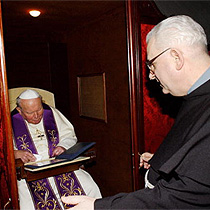 When you ask a Protestant one of their biggest objections to the sacrament of confession, they will usually retort that it is against Sacred Scripture to go to a priest to confess your sins, as the forgiveness of sins comes from God alone. Apologists are frequently able to beat back this charge.
When you ask a Protestant one of their biggest objections to the sacrament of confession, they will usually retort that it is against Sacred Scripture to go to a priest to confess your sins, as the forgiveness of sins comes from God alone. Apologists are frequently able to beat back this charge.
Yet I would like to look at the matter from a different angle. I don’t really want to focus on a biblical rationale for every aspect of the sacrament of confession, not yet at least. Instead, I’d like for us to ponder why it is fitting that God chooses to use priests in the forgiveness of sins through the confessional.
One of the common themes throughout Sacred Scripture is that the people of God, while accountable as individuals, are also part of something larger than themselves. The Bible affirms the importance of a personal relationship with God, but views a personal relationship in and of itself insufficient.
We act this way because we all view ourselves part of the same larger family. When the flood wiped out most of humanity, the world was repopulated through Noah and his children. The blessing of Abraham (a descendant of Noah) was not just for his own benefit, but for all of his descendants throughout history. (Gen 15:5) Just as the sins of a few Israelites led to suffering for the whole (such as when they were forced to wander in the wilderness due to the unbelief of the elder generation), so did the actions of one benefit the entire body. (Numbers 25:1-9)
In the New Covenant, Christ took this communal nature one step further. To describe the relationship between Christians, St. Paul uses language describing each Christian as a different part of the body. (1 Cor 12:11-20) If different parts of the body require each other to function, one part not working would impact the entire body, even if that part was small.
Sin impacts our ability to live as we should. So long as we sin and are attached to sin, the body is limited in its effectiveness. As a result, there is no such thing as a “victimless sin” within Christianity. All are impacted by our sins. When we go to confession, we acknowledge not only that our own sins offend God and damage grace within ourselves, but that they damage the effectiveness of all Christians everywhere. When one commits a mortal sin, they do more than damage their own soul. They provide scandal to the Church, as Christians are not living as they should. This impacts the Churches abilities to save souls through Christ. Our confession reconciles us not only to God, but to each other.
People will still answer that a priest is not required for this reconciliation, as surely we could just confess our sins privately to God and beg for forgiveness privately for how our sins have damaged the body of Christ. While this is certainly true from a theoretical perspective, this is just not the case from a biblical one. When one repents of their sins in the Bible, it is always done to another individual.
The clearest case of this is with David after he commits adultery and arranges the murder of the woman’s husband. David only repents of his sin once God’s representative Nathan confronts him. (2 Samuel 12:1-13) David knew he had sinned grievously in his adultery, otherwise he would not have had Uriah killed to conceal his crime. Even knowing the extent of his guilt, he refused to repent. This speaks to the human psyche’s ability to rationalize away what they do so that it is no longer a sin. This is a skill humanity has nearly perfected in today’s age.
Another thing worth considering is how professing something vocally changes things. It is very easy to say something silently with no witnesses. It is something altogether different when you have to acknowledge your faults before another. One could say it becomes a far more serious endeavor when you are not only willing to renounce your sins, but renounce them forcefully out loud. The first step on the road to repentance requires you to renounce those sins. While it possible to fake such, it becomes far harder to do so. (It goes without saying that such a faked confession would be a sacrilege, and compound sin upon sin!)
A final point to consider is the nature of the priest involved in confession. In addition to serving as God’s representative, they are also someone who has spent at least seven years in deep theological, philosophical and spiritual training in how to help their parishioners overcome sin. Since the point of repentance is that we can learn to overcome sin, it is fitting that we would seek out those trained to help us accomplish that purpose.
The question we must ponder is not whether or not God could have done things differently. Given the evidence, it would be tougher to find a more fitting way of doing things.



